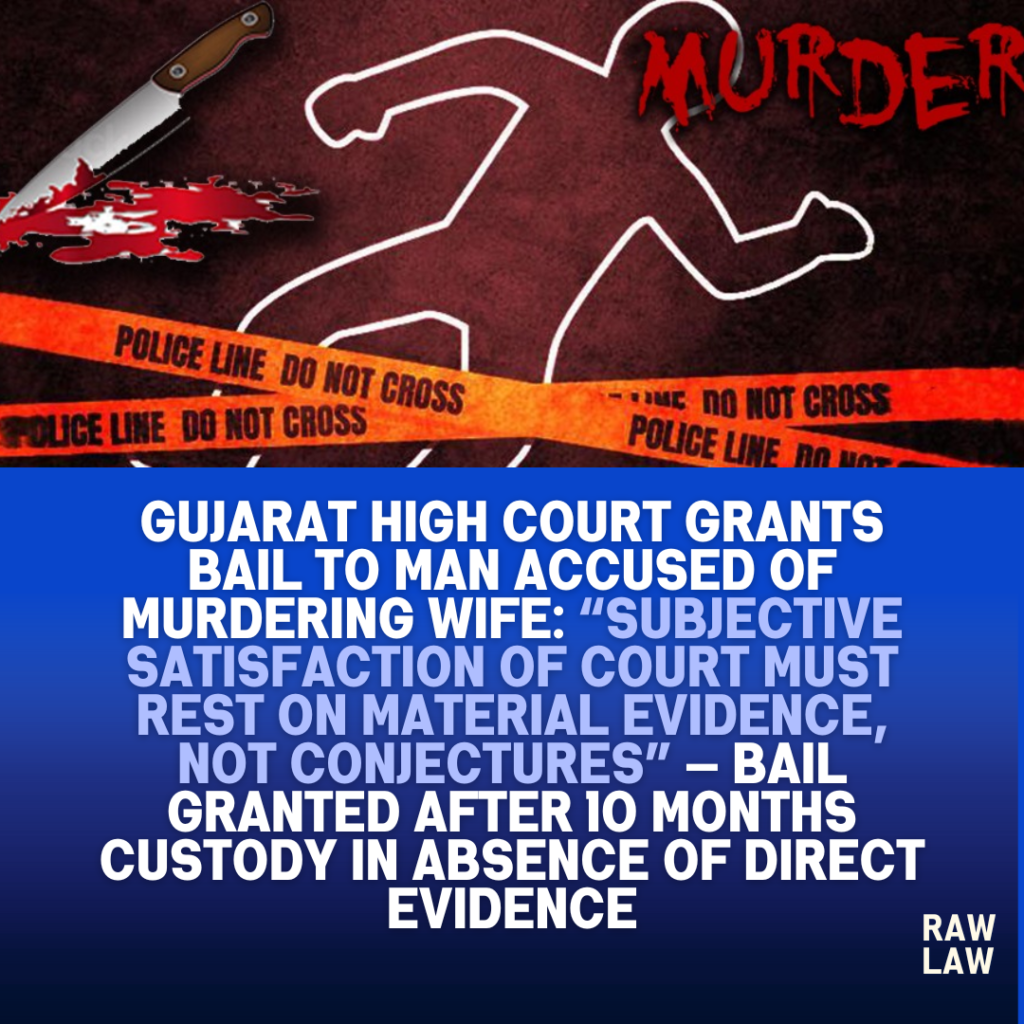Judgment Name: Nishit Patel v. State of Gujarat
Date of Judgment: 11 June 2024
Court: High Court of Gujarat at Ahmedabad
Coram: Justice Hasmukh D. Suthar
Court’s Decision
The Gujarat High Court allowed a regular bail application filed under Section 439 of the CrPC by a man accused of murdering his wife under Section 302 of IPC. The Court observed that there was no direct evidence implicating the applicant, and that circumstantial evidence produced by the prosecution was insufficient at this stage to deny bail. The Court ordered that the applicant be released on regular bail on furnishing a personal bond of ₹10,000 with one surety, subject to conditions including non-interference with the trial and regular appearance.
Facts
The applicant was arrested on 14.07.2023 in connection with the death of his wife, who was found dead under suspicious circumstances. The FIR alleged that the applicant had strangled his wife. The prosecution relied heavily on circumstantial evidence, including the nature of the injuries and the applicant’s conduct post-incident. The applicant remained in custody for nearly 10 months before filing for regular bail.
The investigation was completed, and the chargesheet had been filed. The trial had not commenced, and the applicant contended that continued incarceration amounted to pre-trial punishment.
Issues
- Whether the applicant was entitled to be released on bail despite the charge under Section 302 IPC?
- Whether the circumstantial evidence produced by the prosecution was sufficient to deny bail?
Petitioner’s Arguments
The petitioner contended:
- There was no direct evidence of involvement in the alleged crime.
- The prosecution relied solely on circumstantial evidence, which was inconclusive.
- The applicant had already spent 10 months in custody.
- The investigation was complete and the chargesheet was filed, hence further detention was not necessary.
- The applicant had no criminal antecedents and was willing to cooperate with the trial.
Respondent’s Arguments
The State opposed the bail, arguing that:
- The gravity of the offence under Section 302 IPC was significant and warranted continued detention.
- The postmortem report and circumstantial material established prima facie involvement of the applicant.
- Release on bail could lead to tampering with evidence or influencing witnesses.
Analysis of the Law
The Court reiterated the settled principles that bail is the rule and jail is the exception, and that in a case involving circumstantial evidence, the material on record must be such that it prima facie connects the accused to the offence. It noted that:
“Subjective satisfaction of the Court must rest on material evidence, not on assumptions.”
The Court emphasized that continued detention cannot be justified solely on the seriousness of the charge, especially when the investigation is over and trial has not commenced.
Precedent Analysis
- Satender Kumar Antil v. CBI (2022) 10 SCC 51
- Reaffirmed that bail should be the norm, especially after filing of chargesheet.
- Reaffirmed that bail should be the norm, especially after filing of chargesheet.
- Sanjay Chandra v. CBI (2012) 1 SCC 40
- Held that gravity of offence alone cannot be a reason to deny bail.
- Held that gravity of offence alone cannot be a reason to deny bail.
- P. Chidambaram v. Directorate of Enforcement (2020) 13 SCC 791
- Emphasized that bail jurisprudence must be guided by principles of liberty.
These cases collectively supported the Court’s view that bail could not be denied solely based on the nature of the accusation without substantial supporting material.
Court’s Reasoning
Justice Hasmukh D. Suthar held that:
- The investigation was complete and the applicant had been incarcerated for 10 months.
- There was no direct evidence, and the circumstantial evidence did not meet the threshold to deny bail.
- The trial was yet to begin, and continued detention would not serve the ends of justice.
- Adequate safeguards in the form of bail conditions could ensure the applicant’s availability for trial.
Conclusion
The Court:
- Granted regular bail to the applicant.
- Directed release on execution of personal bond of ₹10,000 with one surety.
- Imposed conditions including:
- Not leaving India without prior permission.
- Appearing before the trial court regularly.
- Not tampering with evidence or threatening witnesses.
Implications
- Reinforces that bail must not be denied solely on gravity of accusation unless supported by compelling material.
- Highlights the importance of judicial scrutiny of evidence at the pre-trial stage, especially in circumstantial cases.
- Serves as a guiding precedent for bail in murder trials where trial is delayed and direct evidence is lacking.
Judgments Referred & Their Role
- Satender Kumar Antil v. CBI (2022) – Bail should be considered after chargesheet unless exceptional circumstances.
- Sanjay Chandra v. CBI (2012) – Gravity alone insufficient to deny bail.
- P. Chidambaram v. ED (2020) – Liberty must be protected even in serious offences.
